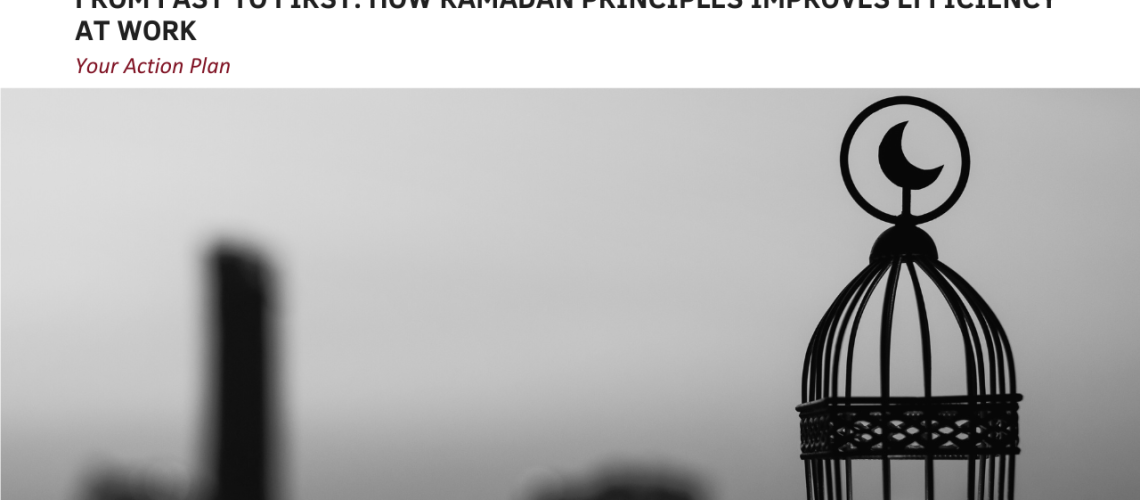By Dr. Salam Slim Saad
What does Ramadan have to do with improving efficiency? Ramadan teaches us the power of focus, self-discipline, and empathy, qualities that not only strengthen our character but also have a profound impact on our professional lives.
Imagine being able to access a well of clarity, concentration, and mental agility—having the ability to tackle with ease and effectiveness. By including the principles of Ramadan, we strengthen our minds, sharpen our focus, and unlock our true potential as leaders in the corporate world.
Ramadan is not just about personal development; it is also about compassion and social awareness. Leading with empathy and lending a helping hand creates a workplace where everyone thrives, fostering success for the whole team.
We all aim to be at the top of our game, striving for extraordinary results and a lasting impact. And while there are countless strategies and techniques out there, sometimes the most profound solutions lie in the most unexpected places. At its core, Ramadan is a time of fasting, self-reflection, and deep spiritual connection. It is a time when the devotees commit to personal growth, discipline, and selflessness.
The principles of Ramadan and their application in the workplace
Ramadan goes beyond abstaining from food and drink; it’s also about self-reflection, discipline, and spiritual development. These principles can significantly enhance workplace efficiency and productivity.

Self-Discipline: Fasting teaches individuals to control desires and impulses, leading to improved time management and focus in the workplace. Setting clear goals and prioritizing tasks help employees avoid distractions and stay on track.
Empathy: Ramadan encourages compassion towards others, especially those less fortunate. In the workplace, fostering a supportive and inclusive environment where team members genuinely care for each other’s well-being boosts productivity and morale.
Patience: Ramadan emphasizes patience during long fasting hours. Similarly, in a professional setting, patience helps employees deal with challenges calmly, preventing overwhelm or frustration.
Gratitude: Expressing gratitude for blessings through acts of charity and community giving is central to Ramadan. At work, showing appreciation towards colleagues or superiors fosters positive relationships and enhances team spirit.
Self-Reflection: Ramadan prompts individuals to seek forgiveness and personal growth. In the workplace, this means regularly assessing performance, seeking feedback, and actively improving in areas of weakness.
Benefits of Implementing Ramadan Principles at Work

- Increased Focus and Productivity: One of the key principles of Ramadan is self-discipline, which involves abstaining from food and drink during daylight hours. This practice can actually improve focus and productivity in the workplace. When employees are fasting, they become more mindful about managing their time efficiently and avoiding distractions. As a result, they are able to stay focused on their tasks and complete them with greater efficiency.
- Enhanced Teamwork and Collaboration: Ramadan also emphasizes community and solidarity. This principle can be applied in the workplace by encouraging teamwork and collaboration among employees. By fostering a sense of unity, individuals are more likely to work together towards common goals, share ideas, support one another, and solve problems collectively. This not only improves efficiency but also creates a positive work environment that promotes creativity and innovation.
- Improved Time Management Skills: Another benefit of implementing Ramadan principles at work is improved time management skills. Fasting requires individuals to carefully plan their day around meals so as not to disrupt their fasting schedule. This discipline translates into better time management practices at work as well. Employees learn how to prioritize tasks, set realistic deadlines, avoid procrastination, and make the most efficient use of their working hours.
- Heightened Empathy and Understanding: During Ramadan, Muslims experience firsthand hunger pangs throughout the day while going about their daily routines alongside non-fasting colleagues or clients. This experience fosters empathy for others’ challenges or limitations both personally during this holy month but also professionally year-round within diverse workplaces or client interactions across different cultures or religions.
- Boosted Employee Well-being: Implementing Ramadan principles can have a positive impact on employee well-being too. The practice of intermittent fasting has been linked to various health benefits such as weight loss, improved digestion, increased energy levels,and enhanced mental clarity – all factors that contribute positively to an individual’s overall physical healthand emotional well-being.
Challenges and Solutions for Incorporating Ramadan Principles at Work:
- Time Management: One of the main challenges in implementing Ramadan principles at work is managing time effectively, especially during fasting hours. Employees may feel fatigued or experience a decrease in energy levels. To overcome this challenge, employers can offer flexible working hours or allow employees to take short breaks for rest or prayer.
- Maintaining Focus: Fasting can sometimes lead to decreased concentration levels, making it difficult to stay focused on tasks. Companies can encourage employees to prioritize their workload and break tasks into smaller, manageable segments. Providing a quiet space for meditation or reflection can also help individuals maintain focus.
- Communication and Collaboration: Effective communication between team members becomes crucial during Ramadan as schedules may differ due to prayer times or iftar (breaking the fast). Employers should foster an environment that encourages open dialogue and understanding among colleagues regarding individual needs during this period.
- Accommodating Diversity: Organizations need to be inclusive of diverse religious practices while respecting privacy and personal choices related to fasting during Ramadan. This requires creating policies that accommodate different faiths and providing resources such as quiet rooms for prayer or offering options for non-fasting employees during lunch breaks.
- Education and Training: Lack of awareness about the significance of Ramadan may present challenges when incorporating its principles at work. Employers should provide educational resources and training sessions to promote cultural sensitivity within the workplace.
Tips for individuals to improve efficiency using Ramadan principles:

- Prioritize And Organize: One of the key principles in Ramadan is prioritizing tasks and managing time effectively. Apply this principle at work by creating a to-do list, setting clear goals, and organizing your tasks based on their importance and deadlines.
- Practice Self-Discipline: Ramadan teaches self-control and discipline, which can be valuable traits in the workplace. Avoid distractions like social media or unnecessary meetings that can derail your focus. Stay committed to completing your tasks efficiently.
- Take Regular Breaks: While fasting during Ramadan, individuals take short breaks throughout the day to rest and rejuvenate. Similarly, taking regular short breaks at work can help you maintain productivity levels without feeling overwhelmed or burnt out.
- Foster Teamwork: Ramadan emphasizes community spirit and working together as a team. In the workplace, collaborate with colleagues, share ideas, delegate responsibilities when necessary, and support each other’s growth.
- Appreciate Diversity: During Ramadan, people from different cultures come together to observe the fast. Embrace diversity in the workplace by respecting others’ beliefs and backgrounds; this fosters a positive work environment where everyone feels valued.
- Maintain Good Health Habits: Eating nutritious food before starting your fast is essential during Ramadan; likewise maintaining healthy habits such as eating well-balanced meals throughout the day will boost energy levels at work too.
- Seek Personal Growth Opportunities: Use moments of solitude during fasting for reflection on personal development goals or learning new skills related to your job role – this way you’ll continuously grow professionally while staying focused on achieving success in all aspects of life.
The journey from fast to first is not an overnight transformation—it is a lifelong commitment to growth and improvement. With focus, discipline, empathy, and selflessness as guiding principles, there’s no limit to what can be achieved.
efficiency is not a luxury – it is a necessity. With focus, discipline, empathy, and selflessness as your guiding principles, there’s no limit to what you can achieve.
fueled by the wisdom of Ramadan. Rewrite the rules, inspire others, and set the example for a new era of leadership. Together, let’s create a corporate landscape where efficiency, compassion, and growth go hand in hand. The world is waiting for leaders like you to make a difference.
Fast, focus, and push ahead to claim your rightful place at the forefront of the corporate world.
From fast to first, the path to extraordinary leadership starts now.


